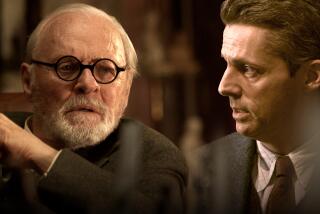Freudless love
- Share via
“Punch-Drunk Love” must be the most misunderstood movie since “2001.” Stephen Farber is the latest critical lightweight to lay into this modest Paul Thomas Anderson masterpiece (“Psychology as a Short Subject,” Dec. 8). He finds Anderson’s creation to be “intentionally shallow,” and “defiantly anti-psychological.” He sucker-punches Anderson with such pejoratives as “glib,” “absurdist,” “postmodern” and, worst of all, “hip.” He thinks that Anderson thinks that “psychotherapy is a joke.”
I don’t know about that, but I do suspect Anderson trusts us to figure out what’s behind Barry Egan’s violent outbursts, since the director’s already made it crystal-clear. Farber asks, “What would motivate her [Emily Watson] to pursue him so avidly?” Open your ears, Stephen. “He needs me.” It’s all over the soundtrack! But to Farber, mired in his beloved, naturalistic “psychological realism,” all this “punch-drunk love” can only be explained in terms of “perverse tendencies.”
This is a simple love story, a kind of beautifully stylized, modern fairy tale that hits every little grace note without any of the ham-fisted, art school intrusiveness that made Wes Anderson’s “The Royal Tannenbaums” so precious and insufferable. This is American filmmaking that can stand with the best of Malick and Kubrick and any other world-class auteur. If guys like Farber weren’t so visually and aurally impaired, if they weren’t weighted down with Freudian mumbo-jumbo, if they could trust something that didn’t immediately click along the familiar, earnest tracks of the films they grew up admiring, maybe they could see a film such as this for what it is, a revolutionary romantic comedy like nothing we’ve seen before.
Charles Chiccoa
Reseda
More to Read
Only good movies
Get the Indie Focus newsletter, Mark Olsen's weekly guide to the world of cinema.
You may occasionally receive promotional content from the Los Angeles Times.









